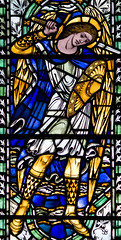 Image via Wikipedia
Image via Wikipedia
This and the next seven posts will comment upon a recent paper released by the Conference of European Churches. The background can be found in a post on Methodist Ecumenical News. The paper is Visions of Unity in Our Churches - Points of Convergence.
The report includes eight points of convergence and I thought it might be interesting to consider them one by one. So, here we go:
Convergence 1
The Unity of the Church is from God, it is the gift of the Holy Spirit. It is not of our making but at the same time it demands our commitment to respond to God’s call to be one in word and deed.
It is likely John 17:20-23 is behind this Convergence. Perhaps it is the text most frequently referred to when making the case for ecumenism. The link will take you to one of my posts devoted to this text. How might we interpret this text? Is it about Jesus' disciples or the Oikoumene of the whole earth? Is unity already reality or something to work towards?
I think the word 'glory' is central to this passage. If we understand glory to mean our experience of God, then Christian unity is evidence of God's work in the world. Convergence 1 captures much of this, especially in the second sentence where they hold in tension the eternal and the 'not yet realised' dimensions of unity.
The first sentence is perhaps less successful. Unity is a gift but more than a gift, it is evidence of God's work in the world and as such it is naturally the outcome of our response to God's call to be one.
Is unity something already real, coming into fruition or do we need to take steps to create it? The former is often seen as a soft option, perhaps called reconciled diversity.
When we take such a relaxed view, we are left with churches unreconciled to the extent they cannot share communion. Why can they not share communion? It is fundamentally about the authority of church leaders. Unity is not visible when there is clear and public separation of the churches.
Oikoumene is not only about churches; it is the reconciliation of all things to God. The reconciliation of church structures seen in this context, is a relatively small step. Perhaps our disunity demonstrates God's priority for this wider Oikoumene? Does the power politics of church structures distract us from commitment to the reconciliation of all things to God?
It is tempting to see unity as eschatological, something to do with end times. And yet perhaps we should think of it as something of beginning times too. Perhaps the act of creation should be seen as an act of unity. For in the creation of diversity, perhaps there is a hint of the kind of unity we seek. It is a unity rooted in reconciliation and there can be no reconciliation without diversity.


















Recent Comments